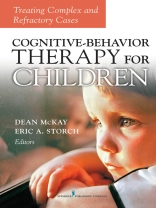‘For clinicians involved with exigent pediatric cases, this book takes therapy to the next level by addressing the real-world challenges that arise with an expansive range of disorders. It will undoubtedly provide clinicians with novel ideas and approaches to advance their therapeutic skills and may be just the resource to revive stalled therapy.’ Score: 98, 5 stars
–Doody’s
‘[This book] faces sub-optimal treatment response head on, illustrating how re-conceptualization, use of alternative strategies, and clinical perseverance can lead to success.’
— Deborah C. Beidel, Ph D, ABPP
Director of Clinical Training
University of Central Florida
‘Chapter authors cogently describe barriers to treatment implementation and recommend systematic adjustments to help improve the outcomes of formerly refractory child and adolescent clients.’
– Wendy K. Silverman, Ph D, ABPP
Florida International University
This book presents comprehensive coverage on cognitive-behavior therapy (CBT) and the treatment of complex and refractory cases in children. With critical, evidence-based information on signs and symptoms, treatment plans, and interventions, this is the one book CBT researchers and clinicians will not want to do without.
Each chapter includes in-depth descriptions of empirically supported CBT interventions, factors that would limit treatment outcome in therapy, guidelines on managing these limiting conditions, and case studies. The contributors also discuss conditions that have typically been associated with poorer outcome.
Important disorders discussed:
- Obsessive-compulsive disorder
- Posttraumatic stress disorder
- Difficult-to-treat youth depression
- Eating disorders
- Sleep disorders
- Pediatric bipolar disorder
- Asperger syndrome
विषयसूची
‘Foreword
Section I: General Issues in Refractory Cases
Chapter 1: The Challenge of Difficult Cases
Chapter 2: Adjustments in Treatment for Limited or Non-Responding Cases in Contemporary Cognitive-Behavioral Therapy with Youth
Chapter 3: Adjustments in Treatment for Limited or Non-Responding Adolescents in Contemporary CBT
Section II: Internalizing disorders
Chapter 4: Obsessive-Compulsive Disorder in Children and Adolescents: Treating Difficult Cases
Chapter 5: Separation Anxiety
Chapter 6: Cognitive Behavioral Therapy for Refractory Selective Mutism
Chapter 7: Specific Phobias
Chapter 8: Children’s Refractory Posttraumatic Stress Disorder: An Ecological, Evidence-Based Perspective
Chapter 9: Better but not Well: Strategies for Difficult-to-Treat Youth Depression
Chapter 10: Cognitive Behavior Therapy for Eating Disorders in Childhood and Adolescence
Chapter 11: Assessment and Treatment of Child and Adolescent Sleep Disorders
Chapter 12: Adjunctive Cognitive Behavior Therapy for Pediatric Bipolar Disorder
Chapter 13: Oppositional Defiant and Conduct Disorders
Chapter 14: Treatment of Refractory Cases of Attention – Deficit Hyperactivity Disorder in Children
Chapter 15: The Challenges of Working with Young People with Asperger Syndrome
Chapter 16: Nocturnal Enuresis and Encopresis: Empirically Supported Approaches for Refractory Cases
Chapter 17: Cognitive-Behavior Therapy for Children and Adolescents with Difficult-to-Treat Substance Use Disorders
Chapter 18: Treatment of Disorders Related to Feeding in Pediatric Populations
Chapter 19: Tourette’s Syndrome
Chapter 20: Charting a course for the future: Empirically supported procedures, translational approaches, and models for complex cases
‘
लेखक के बारे में
Eric A. Storch, Ph D, is an Associate Professor of Clinical Psychology in the Department of Pediatrics and holds joint appointments in the Departments of Psychiatry and Psychology. Dr. Storch is a licensed clinical psychologist and serves as the Director of the University of South Florida Obsessive Compulsive Disorder Program.












